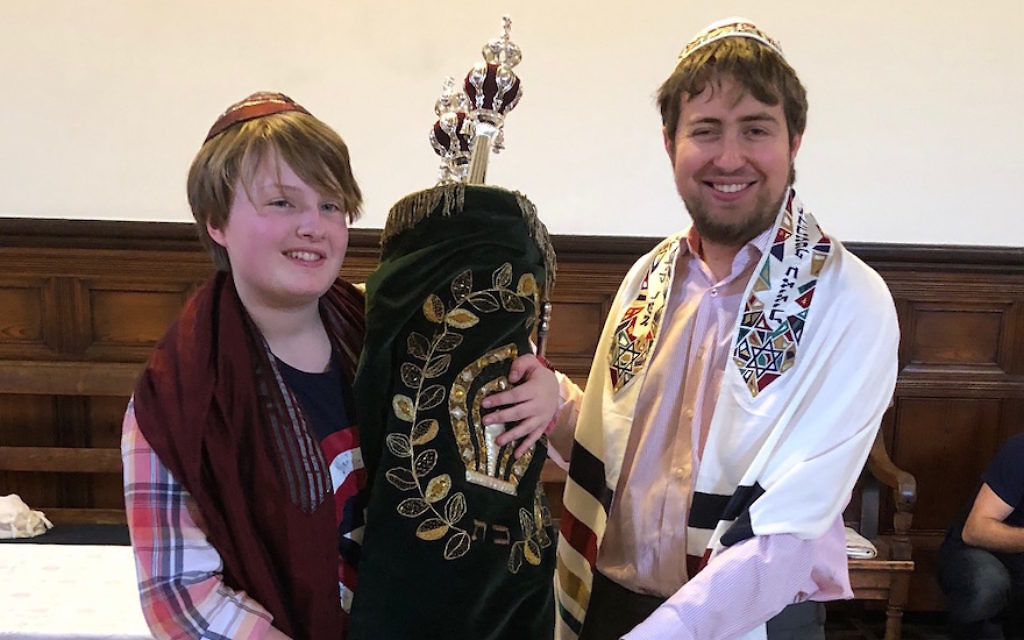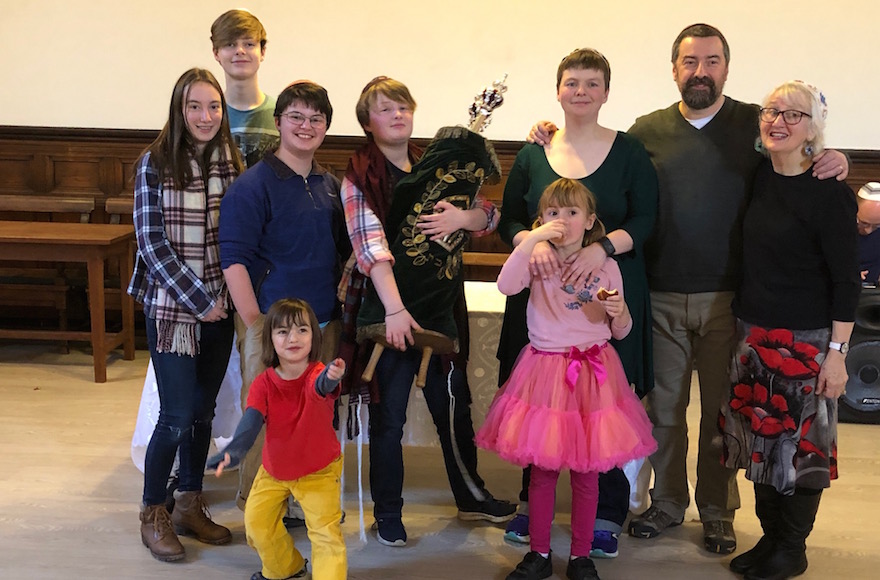This teen had a gender neutral b’nei mitzvah
Esther Thorpe identifies as non-binary - and with the help of Liberal Judaism - celebrated coming of age

When Esther Thorpe came out as non-binary a year ago, identifying neither as male nor female, Miriam Taylor Thorpe was worried. Esther’s mother already had a child come out as gay and feared that Esther, 14, would have trouble finding a Jewish community that would be accepting and inclusive.
The family was already planning for Esther’s batmitzvah , but with the new revelation, Miriam wondered how her child could be comfortable taking part in a Jewish ceremony whose very name — barmitzvah for boys and batmitzvah for girls — is gendered.
“I was quite concerned because if something is important in your coming of age, it should reflect who you are in a person and not squeeze you into the traditional two genders that we happen to have just because of history,” Miriam, who lives with her husband, Martyn, and seven children in the village of Otterburn, in northeast England, told JTA.
Get The Jewish News Daily Edition by email and never miss our top stories Free Sign Up
As transgender and gender nonconforming people gain more acceptance, synagogues are having to think about how to welcome those with a diverse set of gender identities. Statistics about gender identity in children are hard to come by, but a University of Minnesota study published last year found that 2.7 percent of children in the state identify as transgender or gender nonconforming.
Catherine Bell, senior director of program and leadership at Keshet, a Massachusetts-based group that promotes LGBTQ equality, said the organisation gets requests on how to make religious ceremonies inclusive of different gender identities.
“A real frontier for the work that Keshet does these days is around gender identity and gender diversity, a lot around transgender inclusion and making sure non-binary and trans youth are included,” Bell told JTA.
The Thorpe family worked with the student rabbi of their synagogue, York Liberal Jewish Community, to adapt the ceremony, which was held in December. Gabriel Webber is a first-year student at London’s Leo Baeck College, a rabbinical school associated with the Reform and Liberal movement, a partner under the worldwide Reform umbrella.
As part of his research ahead of the ceremony, he came across examples of ceremonies for non-binary children in the United States but not in the United Kingdom.
“Although this is the first one that we’ve had on the radar, it’s going to be far from the last one,” Webber said.

Webber spent a lot of time thinking about how to eschew gendered words in Hebrew during what they came to call Esther’s b’nei mitzvah, using the Hebrew plural term b’nei, which could refer to a mixed-gender group of people. Esther uses “they” as a singular pronoun rather than “he” or “she.”
Before settling on b’nei mitzvah, Webber looked for other possibilities. He found that other non-binary people had used terms such as “ban mitzvah” (“ban” is a made-up word that combines the Hebrew words for boy and girl, “ben” and “bat”) and “zera mitzvah” (“zera” means seed or offspring in Hebrew).
“Esther uses ‘they’ pronouns, which is also a plural being used as a singular, so [b’nei] fit, and it wasn’t making up Hebrew, which is probably better than making up Hebrew,” Webber said.
He also looked into how to call up Esther to read from the Torah. Traditionally, readers are called up using their first name in Hebrew followed by “ben” or “bat” (son or daughter) and their parent’s or parents’ names.
Finding the right way to be called up to the Torah held a major significance for Esther.
“It felt like a big responsibility for other non-binary kids in the future,” Esther told JTA in an email.
Using a Hebrew name that relayed family ties and fit into the larger Jewish tradition was important to Esther, said their mother, who wrote about Esther’s b’nei mitzvah in The Jewish Chronicle.
“If you have a name that doesn’t give that tie into your family and your history, you are much more isolated, and that compounds isolation that I know Esther still does feel — if you are non-binary or trans and you are the only person in your shul that are already in a different position,” Thorpe said.
In the end Esther chose “Esther m’beit Miriam,” meaning “Esther from the house of Miriam.”
In addition to the liturgical changes, Esther had of course to read their Torah portion and write a drash, or sermon. Since the family lives a three-hour drive from York, Esther did their learning via videochat with Webber and a congregant, Hava Fleming.
In December, Esther led the service in front of some 100 people. Afterward there was a celebration with food, ice cream, popcorn machines and doughnuts, as the rite fell during Hanukkah. The event was significant not only because it may have been the country’s first gender-neutral b’nei mitzvah but also because it was York’s first bar, bat or b’nei mitzvah ceremony in over 50 years. The city’s Jewish history is mainly known for a 12th-century anti-Semitic massacre in which all the Jewish residents were killed.
Despite the adaptations, there were still some lingering issues. Though immediate friends and family were respectful of Esther’s gender identity, others gave “batmitzvah ” cards and gifts geared toward girls, Miriam Thorpe said.
“It was quite easy to make the service be reflective of [Esther being] non-binary, once you have a rabbi that’s on board with it and you have a congregation that’s prepared to take that through,” she said, “and as soon as you left the service you’re back to it’s either a barmitzvah or a batmitzvah and there’s nothing in between.”
Still, Esther is happy about how things turned out.
“I feel better,” they said. “I feel part of a community, accepted and acknowledged.”

Thank you for helping to make Jewish News the leading source of news and opinion for the UK Jewish community. Today we're asking for your invaluable help to continue putting our community first in everything we do.
For as little as £5 a month you can help sustain the vital work we do in celebrating and standing up for Jewish life in Britain.
Jewish News holds our community together and keeps us connected. Like a synagogue, it’s where people turn to feel part of something bigger. It also proudly shows the rest of Britain the vibrancy and rich culture of modern Jewish life.
You can make a quick and easy one-off or monthly contribution of £5, £10, £20 or any other sum you’re comfortable with.
100% of your donation will help us continue celebrating our community, in all its dynamic diversity...
Engaging
Being a community platform means so much more than producing a newspaper and website. One of our proudest roles is media partnering with our invaluable charities to amplify the outstanding work they do to help us all.
Celebrating
There’s no shortage of oys in the world but Jewish News takes every opportunity to celebrate the joys too, through projects like Night of Heroes, 40 Under 40 and other compelling countdowns that make the community kvell with pride.
Pioneering
In the first collaboration between media outlets from different faiths, Jewish News worked with British Muslim TV and Church Times to produce a list of young activists leading the way on interfaith understanding.
Campaigning
Royal Mail issued a stamp honouring Holocaust hero Sir Nicholas Winton after a Jewish News campaign attracted more than 100,000 backers. Jewish Newsalso produces special editions of the paper highlighting pressing issues including mental health and Holocaust remembrance.
Easy access
In an age when news is readily accessible, Jewish News provides high-quality content free online and offline, removing any financial barriers to connecting people.
Voice of our community to wider society
The Jewish News team regularly appears on TV, radio and on the pages of the national press to comment on stories about the Jewish community. Easy access to the paper on the streets of London also means Jewish News provides an invaluable window into the community for the country at large.
We hope you agree all this is worth preserving.
-
By Brigit Grant
-
By Laurent Vaughan - Senior Associate (Bishop & Sewell Solicitors)
-
By Laurent Vaughan - Senior Associate (Bishop & Sewell Solicitors)
-
By Laurent Vaughan - Senior Associate (Bishop & Sewell Solicitors)
-
By Laurent Vaughan - Senior Associate (Bishop & Sewell Solicitors)





















